"Eritrea" is an ancient name, associated in the past with its Greek form Erythraia, Ἐρυθραία, and its derived Latin form Erythræa. This name relates to that of the Red Sea, then called the Erythræan Sea, from the Greek for "red", ἐρυθρός, erythros. The Italians created the colony of Eritrea in the 19th century around Asmara, and named it with its current name. After World War II Eritrea was annexed to Ethiopia. In 1991 the Eritrean People's Liberation Front defeated the Ethiopian government. Eritrea officially celebrated its 1st anniversary of independence on May 24, 1991.

Asmara, or Asmera, is the capital and most populous city of Eritrea, in the country's Central Region. It sits at an elevation of 2,325 metres (7,628 ft), making it the sixth highest capital in the world by altitude. The city is located at the tip of an escarpment that is both the northwestern edge of the Eritrean Highlands and the Great Rift Valley in neighbouring Ethiopia. In 2017, the city was declared as a UNESCO World Heritage Site for its well-preserved modernist architecture. Asmera was first settled in 800 BC with a population ranging from 100 to 1000. The city was then founded in the 12th century AD after four separate villages unified to live together peacefully after long periods of conflict.

Isaias Afwerki, born 2 February 1946, is the first and current president of Eritrea, a position he has held since after the Eritrean War of Independence in 1993. He led the Eritrean People's Liberation Front (EPLF) to victory in May 1991, ending the 30-year-old war for independence.

Eritrea made its debut at the 2000 Summer Olympics in Sydney where it sent three athletes to compete in track and field events. At the 2004 Games in Athens, Zersenay Tadese won Eritrea's first ever medal when he finished third in the men's 10000 meters. Eritrea made its winter debut at the 2018 Winter Olympics in PyeongChang, South Korea, where Shannon-Ogbnai Abeda competed for Eritrea in the alpine skiing events.
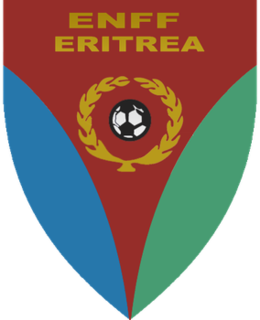
The Eritrea national football team represents Eritrea in men's international football and it's controlled by the Eritrean National Football Federation (ENFF). It is nicknamed the Red Sea Camels. It has never qualified for the finals of the FIFA World Cup and the Africa Cup of Nations. Local side Red Sea FC are the main supplier for the national team, The team represents both FIFA and Confederation of African Football (CAF).

The Eritrean–Ethiopian War, one of the conflicts in the Horn of Africa, took place between Ethiopia and Eritrea from May 1998 to June 2000, with the final peace only agreed to in 2018, twenty years after the initial confrontation. Eritrea and Ethiopia, two of the world's poorest countries, spent hundreds of millions of dollars on the war and suffered tens of thousands of casualties as a direct consequence of the conflict. Only minor border changes resulted.

Eritrean cuisine is a fusion of Eritrea's native culinary traditions, arising from social interchanges with other regions. The local cuisine shares similarities with those of neighboring Ethiopia and other African countries in the region.

The Eritrean War of Independence was a conflict fought between the Ethiopian government and Eritrean separatists from September 1961 to May 1991.
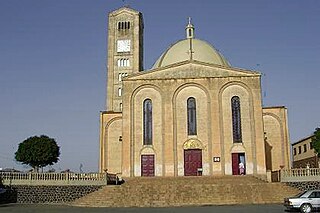
The Eritrean Catholic Church is a Metropolitan sui iuris Eastern particular church headquartered in Asmara, Eritrea. It was established in 2015 by separation of its territory from that of the Ethiopian Catholic Church and the setting up in that territory of a new sui iuris metropolitan Eastern Catholic Church. It follows the Ge'ez form of the Alexandrian liturgical rite.
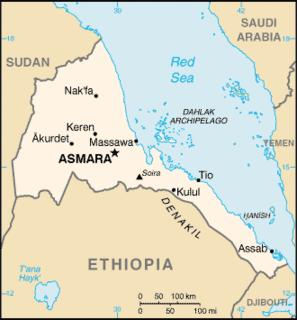
The Eritrean Civil Wars were two conflicts that were fought between competing organizations for the liberation of Eritrea.

Eritrea–United States relations are bilateral relations between Eritrea and the United States. Natalie E. Brown is the current U.S. Ambassador to Eritrea.
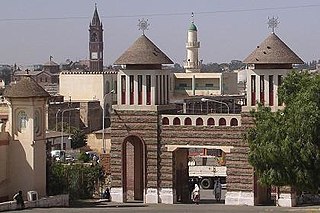
Religion in Eritrea mainly consists of Abrahamic faiths. Since May 2002, the Eritrean government has officially recognized the Eritrean Orthodox Tewahedo Church, the Eritrean Catholic Church, the Evangelical Lutheran Church of Eritrea, and Sunni Islam. All other faiths and denominations are in principle required to undergo a registration process; in practice they are not allowed to register. Among other things, the government's registration system requires religious groups to submit personal information on their membership to be allowed to worship.

Eritrea, officially the State of Eritrea, is a country in the Horn of Africa in East Africa, with its capital at Asmara. It is bordered by Sudan in the west, Ethiopia in the south, and Djibouti in the southeast. The northeastern and eastern parts of Eritrea have an extensive coastline along the Red Sea. The nation has a total area of approximately 117,600 km2 (45,406 sq mi), and includes the Dahlak Archipelago and several of the Hanish Islands.

The Eritrean passport is issued to citizens of Eritrea for international travel. Citizens are not issued passports prior to completion of military service. Eritreans living abroad only receive a passport from their consulate if they have paid their taxes to their country. The passport validity is 5 years or less. Eritreans wanting to take another citizenship need permission from the Eritrean Government if they do not want to lose Eritrean citizenship.

Italian Eritreans are Eritrean-born descendants of Italian settlers as well as Italian long-term residents in Eritrea.

Italian Eritrea was a colony of the Kingdom of Italy in the territory of present-day Eritrea. Although it was formally created in 1890, the first Italian settlements in the area were established in 1882 around Assab. The colony officially lasted until 1947.
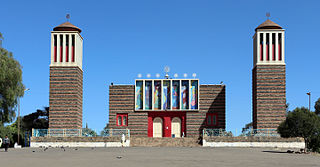
The Eritrean Orthodox Tewahedo Church is an Oriental Orthodox church with its headquarters in Asmara, Eritrea. Its autocephaly was recognised by Shenouda III, Pope of the Coptic Orthodox Church of Alexandria after Eritrea gained its independence from Ethiopia in 1993.
Eritrean Americans are Americans who are of Eritrean ancestry. As of 2013, there are 33,930 Eritrean-born citizens living in the U.S.

Visitors to Eritrea must obtain a visa from one of the Eritrean diplomatic missions, unless they come from one of the visa exempt countries or countries eligible for visa on arrival.
The 2019–20 coronavirus pandemic was confirmed to have reached Eritrea in March 2020.
















